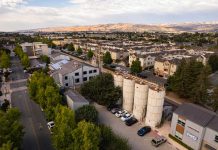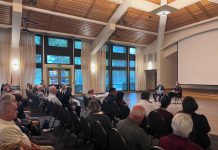I whole-heartedly agree with Lisa Pampuch’s May 2 column on the Redevelopment Agency in which she responded to a column written by Morgan Hill City Councilman Greg Seller.
Why isn’t the elimination of the RDA being considered to erase the general fund deficit? To answer that question, you have to go back several years in city history.
In the early 90’s, when the city wanted to extend the RDA, the citizens of Morgan Hill gathered enough signatures to place the issue on the ballot. It was defeated by nearly a three to one margin. After laying low for about five years, the city hired consultants to assist them in another attempt to extend the RDA. The consultants knew what the outcome was going to be and all they had to do was devise a plan to get there.
The city council devised a series of workshops to get ideas from the community. City officials encouraged each individual group with a project in the city to come forward. For example, one group wanted a soccer complex, another wanted a senior center, another a new library, another group wanted a sports complex, another wanted a community center. Each workshop around the city had discussion groups and the leader of each group was appointed by the city to push the RDA and convince the members of each group that the city could not do all these projects without the RDA. At a meeting at the old school house on Dunne Avenue and Monterey Road the city representatives even let children vote to secure more votes for several projects.
Members from the community who had defeated the earlier extension of the RDA tried to convince the voters that the city was pulling the old smoke and mirrors routine. However, those opposed to the extension could not compete against our own tax dollars spent against us. The council members, who are members of the RDA, then made it clear that there was not near enough money to do the projects without the RDA extension. Those opposed to the
extension suggested we didn’t need to build all of the projects and to just build those with the highest priority. It was suggested that the city list the projects on an individual basis and let the community vote on the highest priority projects. What the city did was put them all on the ballot together so that those who were interested in having their project built had to vote for all the projects to vote for their individual project. This way, the city council could say that they “had a mandate” from the community to build all these projects when, nothing could be farther from the truth. To this day, the council still says that they were given a mandate. Sounds like a self-serving conflict of interest to me.
Those in the community opposed to the extension of the RDA kept asking the same question. If the city, through the RDA, builds all these projects, how are they going to be self-sustaining and how did the city plan to maintain them after they were built. RDA funds cannot be spent on maintenance. Those expenses would have to come from the general fund and jeopardize the ability of the city to fund public safety. Now here we are. Since the extension of the RDA, the city could no longer afford to maintain the fire department and had to contract it out to the California Department of Forestry. The general fund is $1.6 million in the red and now the city is asking the voters to believe the smoke and mirrors again. Yes Lisa, dissolving the RDA should, at least, be on the table. If it was being used for what it was initially intended and governed as it should we, as a community, would not be in this situation.
Art College has served 20 years in local government and is a former assistant city manager/director of finance for the City of Morgan Hill. He is an adjunct instructor at Evergreen Valley Community College and a partner in a local business.







